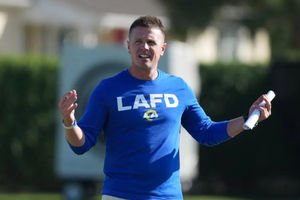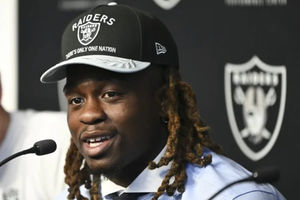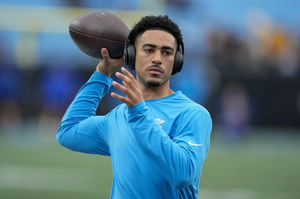Lawsuit: NFL Teams Repeatedly Broke Federal Drug Laws, Handed Opioids Out Like Candy [Updated]

A federal lawsuit filed by former NFL players details allegations that teams repeatedly ignored federal drug laws while pumping players full of mind-blowing amounts of addictive opiate painkillers. The document, originally filed in February, was heavily redacted; the Washington Post, and Deadspin has acquired the fully unredacted court filing from the federal court; it can be read in its entirety below. (Portions with a black background are those redacted in the filing; both parties in the suit agreed to seal this information, which emerged in the course of discovery for the lawsuit.)
The document alleges the amount of drugs doled out by NFL teams, the careless handling of the drugs, and a callous attitude toward laws governing how the treatments should be distributed. Here’s the description of an email from the Minnesota Vikings’ head trainer scolding his staff for “week 17's fiasco,” which included an entire missing bottle of drugs. The DEA surprised six teams in 2014 with spot inspections; the lawsuit alleges a DEA employee tipped the teams off before the shakedowns. The lawsuit also alleges that teams repeatedly ignored DEA guidance about the transport and security of controlled substances.

The document also cites several NFL athletic trainers, including this email from the Cincinnati Bengals head trainer.

Another part of the document described how a league-funded task force, convened to study the powerful drug Toradol, functioned.

An NFL spokesman denied the allegations in the court documents to the Post.
In January, the Associated Press published emails between the Atlanta Falcons’ head athletic trainer and the front office showing that the team gave its players massive amounts of painkillers. The emails were collected as part of the same fact-finding process for the class-action lawsuit. We’re updating this post to present more interesting allegations as we find them.
Update (1:31 a.m.): Former NFL quack Dr. Elliot Pellman, who played a role in how the league downplayed for years the dangers of concussions, is mentioned multiple times. At one point, he’s described along with Dr. Lawrence Brown as “lurking in the background” of every team’s efforts to keep players on the field no matter what. And here’s an email he sent in 2010:

He also is mentioned in the extended narrative about the U.S. Drug Enforcement Administration’s investigation of the NFL in 2010, after a Chargers player was arrested and found to have 100 Vicodin with him, according to the lawsuit. He took part in a presentation done by the DEA about what the NFL doctors should be doing, and he’s looped in on this email chain about how to “solve the NFL/DEA Dilemma”

Another email shows Pellman being proactive after the DEA meeting. He put together a list of concerns and questions that team employees, including doctors, had about what they should do. It included that the DEA proposed that “physicians are to prescribe controlled substances in a manner that is consistent with the standard of the medical community ... not the NFL medical community.”
He comes up in this email:

And he’s accused of trying to suppress the attempts by one doctor to do a survey of controlled medications in the league. It’s worth noting, though, the accusation comes from Dr. David Chao, another former NFL quack who also has been sued by multiple players he treated.

Update (2:05 a.m.): The document contains plaintiffs from all 32 NFL teams. Several of the plaintiffs say that they “received and consumed enormous quantities of pain-numbing and anti-inflammatory medications,” without being informed about what they were being given or warned of the side effects. Some of the narratives, however, are more detailed. Here is the complaint from former Seattle Seahawks offensive tackle Jerry Wunsch:
On November 22, 2003, the night before an away game in Baltimore, Maryland, trainer Ken Smith gave named Plaintiff Jerry Wunsch an Ambien. The next day, before the game, Coach Holmgren asked Mr. Wunsch if he could play, despite excruciating pain down the whole right side of his body, to which Mr. Wunsch replied “I can’t play, Coach. I can’t play today. It’s my first game. I just can’t do it.” Coach Holmgren then called Sam Ramsden, the Seahawks’ trainer, and asked “what can we do to help Mr. Wunsch play today.” Mr. Ramsden brought the doctors over, who gave him a 750 mg dose of Vicodin and Tylenol-Codeine #3, saying they would help, even though Mr. Wunsch was already taking anti-inflammatories as prescribed by his doctors. He played – feeling high – and after half time, the Medications wore off and he told anyone who would listen that he could not play anymore, but Mr. Ramsden, the head trainer, gave him another 750 mg of Vicodin on the field for the second half, telling Mr. Wunsch, “Don’t sue me personally for this.”
Update (2:47 p.m.): The Colts were dispensing a lot of Toradol, according to the lawsuit.

Other teams also are accused of violating federal drug laws.

Edmonton Oilers vs. Calgary Flames Feb 4 NHL Betting Picks
Grading the NFL’s Worst Head Coaching Hires of 2026
MLB Owners Are Killing the World Baseball Classic
- UFC 325 Betting Preview: Three Bet Picks for Saturday Night
- Best NBA Betting Picks and Predictions for Thursday, January 29
- Wednesday Jan. 28 NBA Best Betting Picks, Predictions
- Rangers vs Islanders Jan. 28 NHL Betting Pick and Predictions
- College Basketball Picks Today: Nebraska vs. Michigan Headlines Loaded Slate
- Tuesday NHL Betting Picks: Expert Bets for Jan. 27th
- Best NBA Bets Today: Spread Picks and Player Props for Monday’s Games












